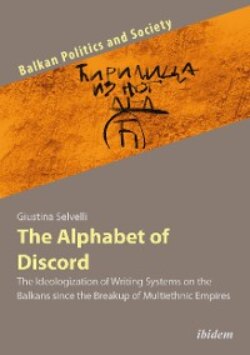Читать книгу The Alphabet of Discord - Giustina Selvelli - Страница 7
1.2 The role of writing and of the “Other” in the national discourse
ОглавлениеIn the process of “positive identification” taking place in the countries of the region, consisting in selecting and highlighting all those cultural features that are perceived as prestigious and characteristic of the national community, the alphabet has proved to be a fundamental element. This is by virtue of the prestige it embodies in the eyes of an internal public that recognizes in it a history of continuity and distinction. Identification, however, is not possible without its negative aspect: the process of national self-definition has always been a process of differentiation from other nations, especially neighboring ones. In this respect, it is particularly relevant to analyze the attitudes propagated by national rhetoric towards the writing systems of the “Others.” Indeed, in order to create its own identity, each nation had to create its “antitype” from which to distinguish itself, since it is not enough to affirm who one is; it is equally important to define who one is not (Bugarski, 2009b: 106).
The relevance of the self-representational dynamics goes far beyond individual, social or cultural practices and acquires power at the political level, as these practices influence decision-making processes, the formation of public opinion, and hence the orientation of political parties themselves. Since nationalism presents itself as a “relational” ideology (Ivanov 2007: 2), it must be understood through the analysis of its context in the broadest sense, externally and internally, synchronically and diachronically. Discourses of identity in the region are still shaped by a specific notion of “foreignness” and, consequently, national rhetoric about the autochthonous writing systems has an impact on the construction of the image of the Other and on the role attributed to it as a possible obstacle in achieving a homogeneous vision of the nation. This factor also explains the interest in focusing on the search for origins, i.e. the ethnogenesis of the national people (Todorova 1996: 71), exploring the national past and distinguishing it as much as possible from that of the Other by insisting on certain features of symbolic differentiation.
The national writing tradition is sometimes used as genealogical “proof” when affirming the antiquity and continuity of the nation: historical facts that might undermine these ideals are thus downplayed or made part of a precise rhetoric of salvation, in a kind of teleological vision according to which the nation continued to fortify itself under the foreign yoke. Unsurprisingly, in the Balkan context, the countries that tend to glorify their linguistic and writing heritage are the same ones that somehow try to hide their contradictory relationship with part of their history, especially their minority communities. In the post-socialist context, EU candidate countries such as Croatia and Bulgaria were strongly pressured to adopt “Western” standards of multiculturalism and minority rights (Kymlicka 2002: 2-3). The interesting fact is that the history of these countries was permeated by conditions of multilingualism, multigraphism and the coexistence of different ethnicities and religions: certainly, the historical interreligious and intercultural experience of Balkan countries like Bulgaria and Croatia is much more remarkable than that of more “mono-ethnic” and religiously homogeneous states like France or others in Western Europe.
Nationalism is certainly a phenomenon determined and shaped by political, economic and social factors, but it would be naive to overlook another fundamental factor, namely its social psychological component (Druckman 1994: 44): in fact, it is also experienced concretely and reiterated metaphorically on many occasions. This means that the individual is also involved in practices of weaving the symbolic imagery associated with collective identity. The nation is hence shaped by the interaction between different levels of power, in a kind of continuous negotiation between the discourses of elites and the responses of the majority, as well as the possible reappropriations of the former by a minority (see Smith 2009: 19). Individuals in a given national community carry and maintain feelings, beliefs and attitudes towards their own nation: these subjective factors in turn influence the value they ascribe to other nations, which may be seen as more or less related and close to their own, or even as threatening actors, or as enemies.
The emotional, social psychological aspects of nationalism largely explain the emergence of stereotypes, which are understood as widespread and shared representations of self and other, and are functional for the maintenance of a certain identitarian “status quo” (Druckman 1994: 50). Often, the group perceived as different from the majority remains trapped in a fixed, even anachronistic representational category; in the Balkans, we find many examples of the use of labels referring to the prejudices and conceptual categories of the past: the adjective “Turkish” as pejorative (cf. Jezernik 2010), “Chetnik” or “Ustasha,” etc. This process is linked to continuous practices of “re-actualization” of specific values from a more or less distant past, which are functional to the construction and maintenance of the national image. With regard to understanding this phenomenon, it is particularly relevant to analyze the experience of a nation on a diachronic level and to look for analogies or differences in relation to situations from another, more or less distant, temporal context.
